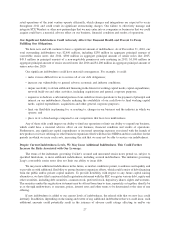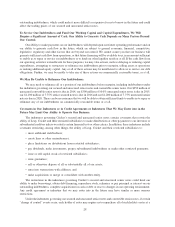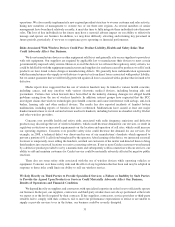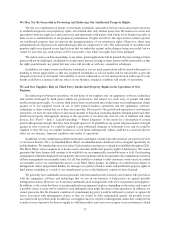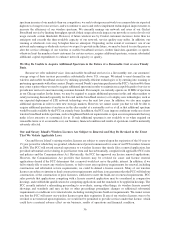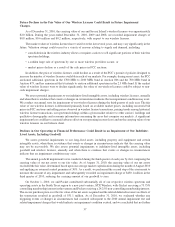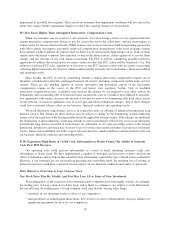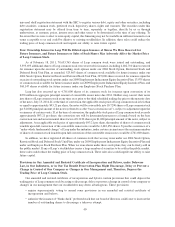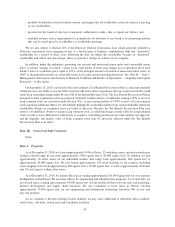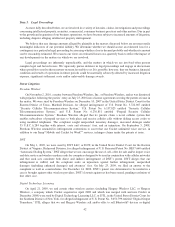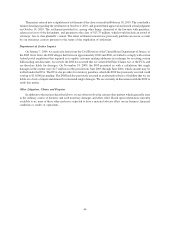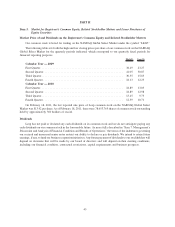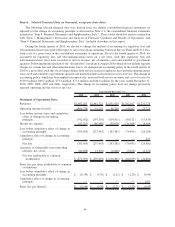Cricket Wireless 2010 Annual Report Download - page 42
Download and view the complete annual report
Please find page 42 of the 2010 Cricket Wireless annual report below. You can navigate through the pages in the report by either clicking on the pages listed below, or by using the keyword search tool below to find specific information within the annual report.spectrum in many of our markets than our competitors, we seek to design our network to accommodate our expected
high rates of usage for our services, and we continue to assess and seek to implement technological improvements to
increase the efficiency of our wireless spectrum. We currently manage our network and users of our Cricket
Broadband service by limiting throughput speeds if their usage adversely impacts our network or service levels or if
usage exceeds certain thresholds. However, if future wireless use by Cricket customers increases faster than we
anticipate and exceeds the then-available capacity of our network, service quality may suffer. In addition, our
roaming or wholesale costs may be higher than we anticipate. Depending on the extent of customers’ use of our
network and roaming or wholesale services we expect to provide in the future, we may be forced to raise the price or
alter the service offerings of our wireless or mobile broadband services, further limit data quantities or speeds,
otherwise limit the number of new customers for certain services, acquire additional spectrum, or incur substantial
additional capital expenditures to enhance network capacity or quality.
We May Be Unable to Acquire Additional Spectrum in the Future at a Reasonable Cost or on a Timely
Basis.
Because we offer unlimited voice, data and mobile broadband services for a flat monthly rate, our customers’
average usage of these services per month is substantially above U.S. averages. We intend to meet demand for our
wireless and mobile broadband services by utilizing spectrally efficient technologies or by entering into roaming or
partnering agreements with other carriers. Despite our and Denali’s spectrum purchases in the FCC’s Auction #66, there
may come a point where we need to acquire additional spectrum in order to maintain an acceptable grade of service or
provide new services to meet increasing customer demands. For example, we currently operate on 10 MHz of spectrum
in our Chicago market. In the future, we may be required to acquire additional spectrum in this and other markets to
satisfy increasing demand (especially for data and mobile broadband services) or to deploy new technologies, such as
our expected deployment of LTE network technology over the next few years. In addition, we also may acquire
additional spectrum in order to enter new strategic markets. However, we cannot assure you that we will be able to
acquire additional spectrum at auction or in the after-market at a reasonable cost or at all or that additional spectrum
would be made available by the FCC on a timely basis. In addition, the FCC may impose conditions on the use of new
wireless broadband mobile spectrum, such as heightened build-out requirements or open access requirements that may
make it less attractive or economical for us. If such additional spectrum is not available to us when required on
reasonable terms or at a reasonable cost, our business, financial condition and results of operations could be materially
adversely affected.
Our and Savary Island’s Wireless Licenses Are Subject to Renewal and May Be Revoked in the Event
That We Violate Applicable Laws.
Our and Savary Island’s existing wireless licenses are subject to renewal upon the expiration of the 10-year or
15-year period for which they are granted, which renewal period commenced for some of our PCS wireless licenses
in 2006. The FCC will award renewal expectancy to a wireless licensee that timely files a renewal application, has
provided substantial service during its past license term and has substantially complied with applicable FCC rules
and policies and the Communications Act. Historically, the FCC has approved our license renewal applications.
However, the Communications Act provides that licenses may be revoked for cause and license renewal
applications denied if the FCC determines that a renewal would not serve the public interest. In addition, if we
fail to timely file to renew any wireless license, or fail to meet any regulatory requirements for renewal, including
construction and substantial service requirements, we could be denied a license renewal. Many of our wireless
licenses are subject to interim or final construction requirements and there is no guarantee that the FCC will find our
construction, or the construction of prior licensees, sufficient to meet the build-out or renewal requirements. FCC
rules provide that applications competing with a license renewal application may be considered in comparative
hearings, and establish the qualifications for competing applications and the standards to be applied in hearings. The
FCC recently initiated a rulemaking proceeding to re-evaluate, among other things, its wireless license renewal
showings and standards and may in this or other proceedings promulgate changes or additional substantial
requirements or conditions to its renewal rules, including revising license build-out requirements. We cannot assure
you that the FCC will renew our wireless licenses upon their expiration. If any of our wireless licenses were to be
revoked or not renewed upon expiration, we would not be permitted to provide services under that license, which
could have a material adverse effect on our business, results of operations and financial condition.
36



